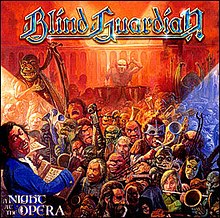A Night at the Opera (Blind Guardian album)
This article has multiple issues. Please help or discuss these issues on the talk page. (Learn how and when to remove these template messages)
|
| A Night at the Opera | ||||
|---|---|---|---|---|
 Cover art by Paul R. Gregory | ||||
| Studio album by | ||||
| Released | 25 March 2002 | |||
| Recorded | January–December 2001 at Twilight Hall Studios, Grefrath and Hammer Music Studios, Hamburg, Germany | |||
| Genre | ||||
| Length | 67:01 | |||
| Label | Virgin/Century Media | |||
| Producer | Charlie Bauerfeind | |||
| Blind Guardian chronology | ||||
| ||||
| Singles from A Night at the Opera | ||||
| ||||
| Review scores | |
|---|---|
| Source | Rating |
| AllMusic | |
| Exclaim! | favorable[2] |
| Rock Hard | 9/10[3] |
A Night at the Opera is the seventh studio album by the German power metal band Blind Guardian, released in 2002. It is named after the 1975 Queen album of the same name, which is itself named after the Marx brothers film of the same name.
This album continues a stylistic change from power metal into a more progressive sound, with multiple overlaid vocals, choirs, orchestral keys and guitar leads and less emphasis on powerful guitar riffs and heavy rhythms. As a result, drummer Thomen Stauch would leave the group, citing dissatisfaction with the direction the group was going in.
Album content[]
There are seven different studio versions and two official live versions of "Harvest of Sorrow" – two in English, two in Spanish ("Mies Del Dolor", "La Cosecha Del Dolor"), one in Italian ("Frutto Del Buio"), one in French ("Moisson de Peine"), and one in a mix of all of the versions except the English acoustic and Italian (also called "Harvest of the World").
The song "Battlefield" is featured as the music in the heavy metal edition of the Adult Swim game Robot Unicorn Attack.
Track listing[]
All lyrics are written by Hansi Kürsch; all music is composed by André Olbrich and Kürsch, except bonus tracks by Marcus Siepen, Kürsch and Thomen Stauch.
| No. | Title | Length |
|---|---|---|
| 1. | "Precious Jerusalem" | 6:22 |
| 2. | "Battlefield" (Olbrich, Kürsch and Stauch) | 5:37 |
| 3. | "Under the Ice" | 5:44 |
| 4. | "Sadly Sings Destiny" | 6:04 |
| 5. | "The Maiden and the Minstrel Knight" | 5:30 |
| 6. | "Wait for an Answer" | 6:30 |
| 7. | "The Soulforged" (Olbrich, Kürsch and Stauch) | 5:18 |
| 8. | "Age of False Innocence" | 6:05 |
| 9. | "Punishment Divine" | 5:45 |
| 10. | "And Then There Was Silence" | 14:06 |
| No. | Title | Length |
|---|---|---|
| 11. | "Harvest of Sorrow (Acoustic Version)" (Japanese bonus) | 3:39 |
| 12. | "Mies del dolor" (Spain/North American bonus) | 3:39 |
| 13. | "La cosecha del dolor" (Argentine bonus) | 3:39 |
| 14. | "Frutto del buio" (Italian bonus) | 3:39 |
| 15. | "Moisson de peine" (French bonus) | 3:39 |
| No. | Title | Length |
|---|---|---|
| 11. | "Age of False Innocence (Preproduction Mix 2018)" | 5:42 |
| 12. | "Under the Ice (Preproduction Mix 2018)" | 5:40 |
Lyrical references[]
The album features the concepts and themes familiar to Blind Guardian fans, such as historical battles and religious references.
- "Precious Jerusalem" is based on the final days of Jesus of Nazareth and his temptation in the desert.
- "Battlefield" is based on Song of Hildebrandt, an old German tale of a father and son who find themselves in a duel to the death.
- "Under the Ice" has connections to the Iliad, focuses on Cassandra and what happened to her after the Trojan War, particularly from The Oresteia.
- "Sadly Sings Destiny" is based on the religious aspect of the Messiah in the Old Testament, and tells of the crucifixion of Jesus from the point of view of a character who reluctantly helps fulfil the prophecy, by doing such things as building the cross and weaving the Crown of Thorns.
- "The Maiden and the Minstrel Knight" is based on an episode from the story of Tristan und Isolde.
- "The Soulforged" is based on the Dragonlance saga's tales of the mage Raistlin Majere.[4]
- "Age of False Innocence" is about Galileo Galilei.
- "Punishment Divine" is about Nietzsche's decline into insanity where he imagines himself being judged by a court of saints.
- "And Then There Was Silence" is about Cassandra's visions of the coming Trojan War. It was inspired by Homer's Iliad and Odyssey and Virgil's Aeneid.
- "Harvest of Sorrow" is based on Tolkien's tragic story of Túrin Turambar, which appears in the Silmarillion.
Chart positions[]
Album – Billboard (North America)
| Year | Chart | Position |
|---|---|---|
| 2002 | Top Independent Albums | #37 |
Personnel[]
|
Blind Guardian
Guest musicians
|
Production
|
References[]
- ^ a b "A Night at the Opera - Blind Guardian | AllMusic". AllMusic.
- ^ a b Stewart-Panko, Kevin (June 2002). "Aggresstive Tendenacies: Metal & Hardcore review: Blind Guardian – A Night At The Opera". Exclaim!. Archived from the original on 8 January 2016. Retrieved 3 September 2009.
- ^ Rensen, Michael. "A Night at the Opera review". issue 187. Archived from the original on 8 January 2016. Retrieved 20 May 2013.
- ^ Pizek, Jeff (5 April 2002). "Blind Guardian's new CD has the ring of Queen", Daily Herald, p. 4.
- 2002 albums
- Blind Guardian albums
- Century Media Records albums
- Virgin Records albums
- Albums produced by Charlie Bauerfeind
- Cultural depictions of the Marx Brothers